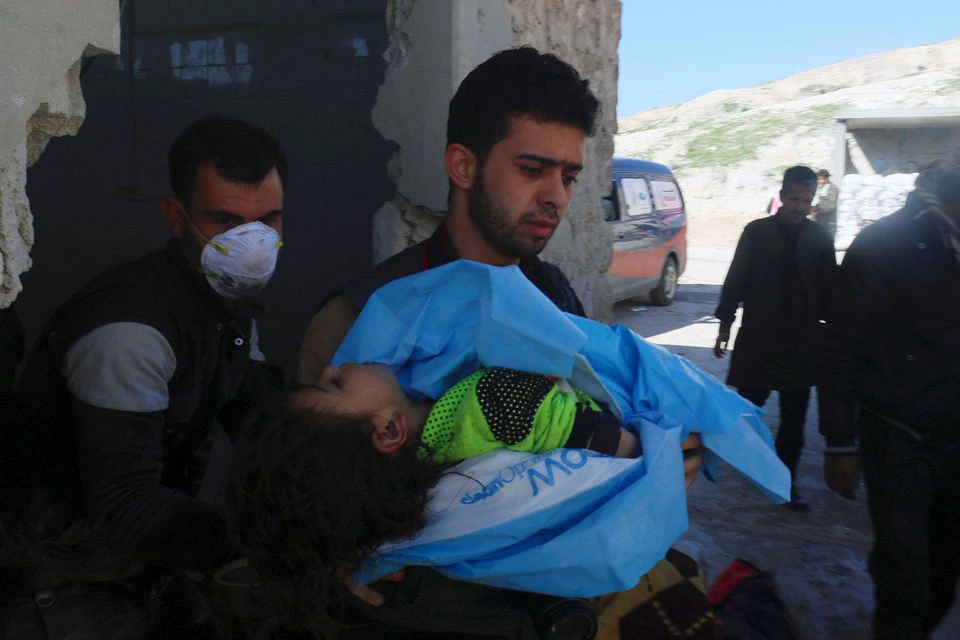
Abdel Hamid al-Youssef claimed that poison gas was dropped on his town in Syria in 2017, killing 25 members of his family, including his wife and infant twins, in an attack that a UN-backed investigation concluded was carried out by the Syrian government.
‘Everything was erased in a matter of seconds. Life had been entirely obliterated,’ Youssef, 33, spoke of the sarin assault in Khan Sheikhoun, one of dozens of occasions chemical weapons have purportedly been used in the country’s 11-year-long conflict.
According to Human Rights Watch, a New York-based rights organisation, the bombardment in Syria’s rebel-held northwest killed at least 90 people, 30 of whom were children.
Syria’s allies, Russia and China, had previously vetoed moves at the UN to initiate an investigation by the International Criminal Court (ICC) into war crimes and crimes against humanity in Syria by the time of the hit.
As the fifth anniversary of the Khan Sheikhoun incident approaches, survivors and human rights activists warn that the failure to pursue those responsible for chemical strikes in Syria could encourage the use of such banned weapons in the future.
Without giving specific evidence, the US and other countries have warned Russia that it may use chemical or biological weapons in its invasion of Ukraine. find out more The claims have been denounced by the Kremlin as ‘diversionary techniques.’
Youssef, who wants Syrian President Bashar al-Assad held accountable, stated, ‘There is no deterrent for Russia. The criminal is free until today.’
The Syrian government has denied employing chemical weapons in the conflict, which began as an uprising against Assad’s regime and has claimed the lives of at least 350,000 people. In 2013, Syria ratified international treaties prohibiting the use of such weapons.
Youssef remembers every moment of the Khan Sheikhoun attack, starting with the sound of jets launching many air raids on the town beginning at 6:30 a.m.
Youssef went to his parents’ house in an attempt to get his family to safety. His wife continued on while he came to a halt to assist a neighbour who was yelling for assistance.
Youssef stated that he assisted in the loading of victims into a pickup truck. Some people were literally foaming at the mouth.
Youssef passed out while attempting to assist his niece. He awoke hours later in the hospital, only to realise the magnitude of the disaster when he went home that afternoon.
‘There were chambers dedicated to martyrs. I couldn’t decide which one to take: my brother, nephew, children, wife, etc,’ Youssef stated. ”They covered them with shrouds. We carried them to the cemetery and laid them to rest there.’
The Trump administration retaliated by shooting 59 cruise missiles at the air strip from which the strike was claimed to have originated.
Six months later, a report by the United Nations and the Organisation for the Prohibition of Chemical Weapons (OPCW), which enforces treaties prohibiting the use of such weapons, concluded that the victims’ symptoms were compatible with large-scale sarin poisoning.
It said it was ‘convinced’ that the Syrian Arab Republic was behind the sarin attack in Khan Shaykhun on April 4, 2017. In 2019, the town was taken seized by government forces.
Youssef says he still feels the affects five years later and faints when he smells strong odours like household chlorine. The psychological impact, on the other hand, has been the most significant, he added, adding that he lives in fear.
Survivors of sarin strikes may experience long-term eye impairments, gastro intestinal troubles, and post-traumatic stress disorder, according to chemical weapons specialist Professor Alastair Hay.
‘The main impact is usually catastrophic death, and it happens very quickly,’ he said, adding that additional evidence on the long-term effects of chemical weapons exposure is needed.
Russia, which backed Assad militarily in 2015, said the chemicals belonged to Syrian rebels, not the government, at the time of the strike. President Vladimir Putin stated that he believes the United States is planning more missile strikes, and that rebels are planning chemical weapons attacks to provoke them.

Post Your Comments